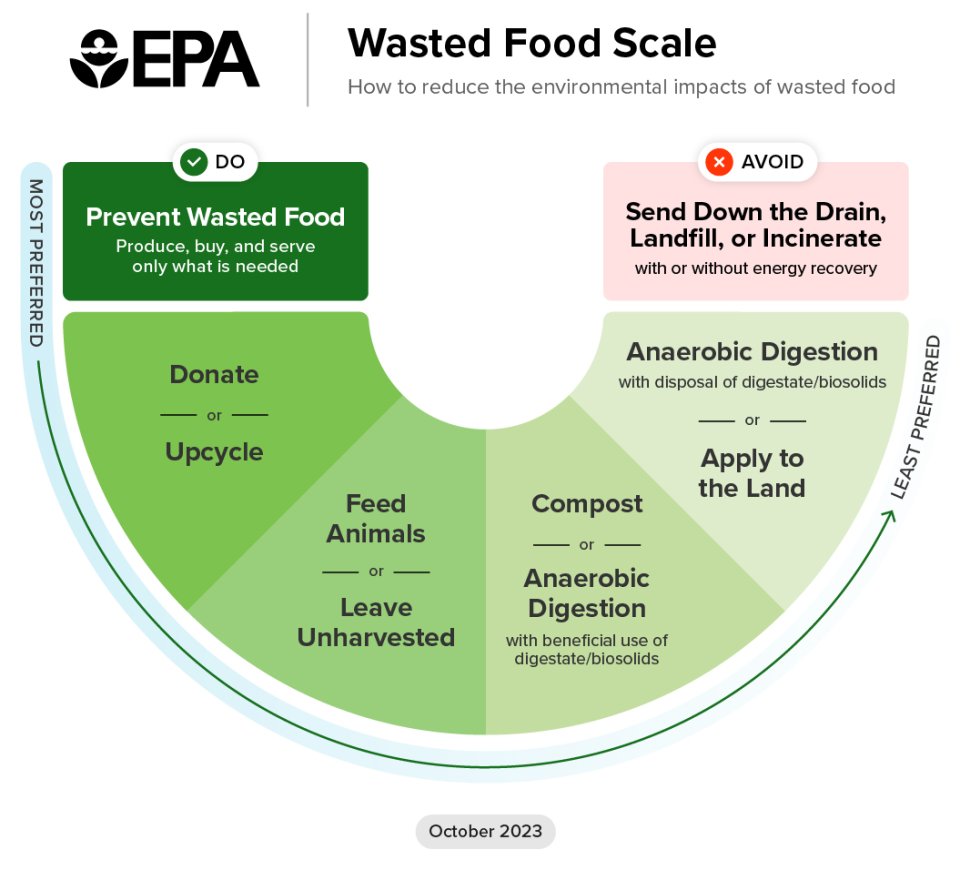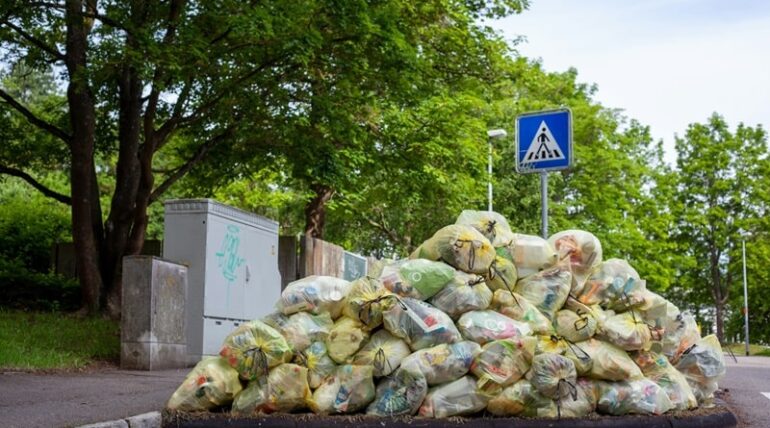Food waste in the United States has become a critical issue that has environmental, economic, and social implications. The long history of food waste in America shows us that food waste dates back to the 1600s but has gradually become more pressing with time.
Today, 30-40 percent of the food supply in the United States is wasted, translating to approximately 133 billion pounds of food each year.
With such a large quantity of food waste being sent to landfills, proper food waste management is more important than ever, and on all levels of the supply chain. From households to small businesses to nationwide organizations, everyone can do their part to fight against the food waste crisis.
To get a better idea of proper food waste management, let’s explore why it’s important, how it can be applied across the supply chain, and the policies that are shaping the future of food and waste management.
Key Takeaways
- Proper food waste management should be applied at all levels of the supply chain, with strategies such as better inventory management, staff training, improved food preservation techniques, and technology integration, among others.
- New policies and regulations are driving increased awareness, with many national and state-wide laws aimed at diverting food from landfills and encouraging food donations and recycling efforts.
- Businesses play an important role in reducing waste, as they can set standards within their industry and community by enforcing company-wide sustainability goals, which may include composting, food donation, or community partnerships.
- As waste management in the food industry becomes a high priority, businesses should partner with waste management companies for comprehensive solutions that address industry-specific challenges.
What is Food Waste Management?
Food waste management refers to the approach of preventing, reducing, and repurposing food waste throughout its entire life cycle. By keeping food waste out of landfills, the food waste management industry helps mitigate the environmental, social, and economic consequences of food waste, addressing issues such as greenhouse gas emissions, food insecurity, the loss of natural resources, and pollution.

Why is Food Waste Management Important?
Reducing food waste should be a top priority for both households and businesses, as the current food waste crisis has severe consequences, both for the environment and our pockets.
To start, food waste affects the environment in a number of ways. It negatively impacts biodiversity, causes air and water pollution, and wastes natural resources required to produce it, including land, water, and energy. In addition, food waste is gaining widespread attention for its contribution to climate change, but how?
When food is sent to landfills, it undergoes a decaying process that releases methane, a powerful greenhouse gas that contributes to climate change. Studies show that municipal solid waste landfills are the third-largest source of methane emissions from human activities in the United States, with food waste in landfills contributing to more methane emissions than any other landfilled material.
Aside from environmental consequences, there’s also and economic impact of food waste that affects both businesses and individuals. In the United States, food waste costs an estimated $218 billion, or 1.3% of GDP, annually. This loss is experienced at every level of the supply chain. When manufacturers and retailers discard ugly produce food waste, overproduction, or changes in customer demand, they have to raise their prices to make up for losses in labor and resources. Aside from households experiencing higher grocery prices, many families spend money on groceries that they never consume, often due to over purchasing, misunderstandings of food expiration dates, or spoiled food due to improper storage.
And lastly, high levels of food waste also have social implications. In the United States, 44 million people are food insecure, meaning food donation programs and collaborations with nonprofit organizations can help fight the food insecurity crisis while mitigating food waste from landfills.
The implications of food waste have gained national and global attention. In fact, the United States set a goal to cut food loss and waste by 50% by 2030, presenting opportunities to address climate change, increase food security, productivity, and efficiency, and conserve energy and other resources.
Food Waste Management Practices Across the Food Supply Chain
There are many ways to reduce food waste in the supply chain, from production to consumption.
One of the ways to improve waste management in the food industry is through efficient inventory management. Starting at the production level, improved inventory management can minimize overproduction, ensuring manufacturers only produce what is needed and desired by retailers and consumers. Distributors, retailers, and food service providers can also benefit from this, as many organizations overstock and must throw away excess food products. By prioritizing accurate demand forecasting, businesses can prevent spoilage, ensure timely deliveries, and save money.
Improved food preservation techniques are also a great strategy, as lots of food waste is produced due to improper storage and logistics. To preserve food in a more efficient manner, advanced technology can be used to monitor temperature and humidity levels and improve transportation logistics.
Having said that, the food waste management industry is increasingly adopting food waste recycling and management technology. This is because advanced technology helps address many of the contributors to food waste, leading to an increase in technologies that focus on food waste tracking, treatment, and management.
At the consumer level, there needs to be increased education on how to manage food waste in our everyday lives. Since many people aren’t aware of the impact household waste has on the environment, campaigns and local initiatives can help spread awareness and change consumer behavior.
To achieve the United States’ goal of reducing waste by 50%, there needs to be a collective effort to reduce food waste at all levels of the supply chain. By implementing food and waste management strategies, we can reduce the amount of waste in landfills, therefore minimizing the environmental, economic, and social consequences of it.

Policy and Regulation: Shaping the Future of Food Waste Management
U.S. policies and regulations are the key to driving increased awareness, enhancing waste management practices, and keeping food out of landfills. So, what is the U.S. doing to drive change?
An increase in national and state-level laws has helped bring attention to the crisis. Food waste laws in the U.S. vary by state, with many laws directed at businesses that produce over a specified amount of food waste, often requiring them to improve their recycling efforts or donate excess food when eligible. There are also various initiatives, such as tax incentives, to encourage businesses to participate.
When comparing food waste by state, it demonstrates that states with low food waste have comprehensive food recovery programs in place. This shows the importance of accessibility, meaning organizations should prioritize partnerships with food banks, nonprofit organizations, and waste management companies to reduce their waste.
Certain legislative efforts have contributed to this as well, such as the USDA and EPA’s joint promotion of the U.S. Food Waste Challenge, which includes a wide range of activities to reduce waste in school meals, educate consumers about food waste and food storage, and develop new technologies to reduce food waste. The Bill Emerson Good Samaritan Food Donation Act was also passed to encourage food donations to nonprofit organizations by minimizing liability.
By obligating and encouraging food waste reduction and management, many businesses are embracing innovative technology, techniques, and collaborations to enhance their food and waste management. With this, we’ve seen an increase in food donations and composting and recycling efforts.
How to Manage Food Waste?
Effective food waste management requires strategies for both reducing waste and handling waste in a sustainable and effective way. In both cases, an important step in this process is increased awareness regarding the impact of waste, how it’s generated, and what each business and household can do to make a difference.

To prevent waste at the source, some household food waste solutions include thoughtful meal planning and portion size, embracing “ugly” produce, purchasing only necessary quantities, accurately understanding expiration dates, and adopting proper storage techniques. Strategies to reduce food waste in food-related businesses include optimizing resources with precision farming, temperature-controlled storage and transportation, staff training, and technology integration, among others.
And since food waste will never be 100% avoidable, food waste management must address environmentally friendly solutions to divert waste from landfills. Food waste recycling, which is the process of converting food waste into useful materials or products, is a broad term that encompasses many eco-friendly solutions. Among these, composting food waste is an essential practice that turns waste into nutrient-rich soil through natural decomposition. Another waste management solution is turning food waste into energy, an approach that reduces landfill use while creating a sustainable energy source.
How Management Can Reduce Food Waste?
Reduction and prevention are two key terms when it comes to sustainable waste management, as they both work to minimize environmental impact, conserve resources, and enhance cost efficiency. As mentioned, there are many approaches to food waste management, with improved forecasting accuracy, optimized food storage and preparation processes, and portion control having the potential to significantly decrease the amount of waste produced.
However, it’s important to note that for these strategies to be successful, there needs to be active participation from both companies and individuals. Since awareness is the first step to making a difference, every level of the supply chain must do its part to understand food waste and make innovative changes to address it.
This may include training employees and engaging and fostering a workplace culture that prioritizes sustainability. Changing consumer behavior is also key to reducing waste, as consumer preferences are the driving factor behind market trends. When consumers start accepting produce with blemishes, avoiding bulk purchasing, and supporting companies that prioritize food waste management, they work to change current consumer expectations, promoting both sustainability and reduced food waste.
Businesses and organizations are also big players in reducing large-scale waste, as we’ll see below.

The Role of Businesses and Organizations in Reducing Food Waste
Businesses and organizations play a key role in reducing waste, as they produce food waste on large scales and can set standards within their industry and community. By managing resources in an eco-friendlier way, businesses can help reduce the environmental consequences of food waste while enjoying the economic benefits of reducing waste-related costs.
For efficient waste management in the food industry, businesses should conduct a food waste audit. Food waste audits analyze the causes, types, and quantity of food waste generated by organizations. These insights help businesses identify what changes they can make to reduce waste, thus helping them act on their reduction goals. Some of the ways they can optimize their supply chain include the use of food preservation technologies, employee training, and sustainable food packaging solutions to extend a product’s shelf life.
Businesses can also partner with waste management companies to improve their recycling efforts. Strategies like composting for businesses, turning waste into animal feed, and anaerobic digestion make a huge difference to the environment. By partnering with a local waste management company, businesses have access to tailored solutions that fit their needs and combat any industry-specific challenges.
Businesses and organizations should also prioritize partnerships with local food banks and community groups for food donations. This not only helps them reduce waste but also contributes positively to the community.
By setting strict sustainability standards, companies can engage employees and customers, fostering a culture of sustainability that extends beyond organizational boundaries.
The Bottom Line
Businesses and individuals are increasingly learning how to manage food waste to reduce the environmental, economic, and social consequences of waste. Food waste management can be applied at every stage of the supply chain, with new policies and regulations enforcing and encouraging companies to make an active change.
To comply with regulations and foster a sustainable work culture, businesses should partner with a food waste management company for comprehensive solutions. At Shapiro, we provide a range of organic waste management services to help companies meet their reduction goals and take advantage of government initiatives.
Contact us to discuss how our team can support you.
Baily Ramsey, an accomplished marketing specialist, brings a unique blend of anthropological insight and marketing finesse to the digital landscape. Specializing in educational content creation, she creates content for various industries, with a particular interest in environmental initiatives.



